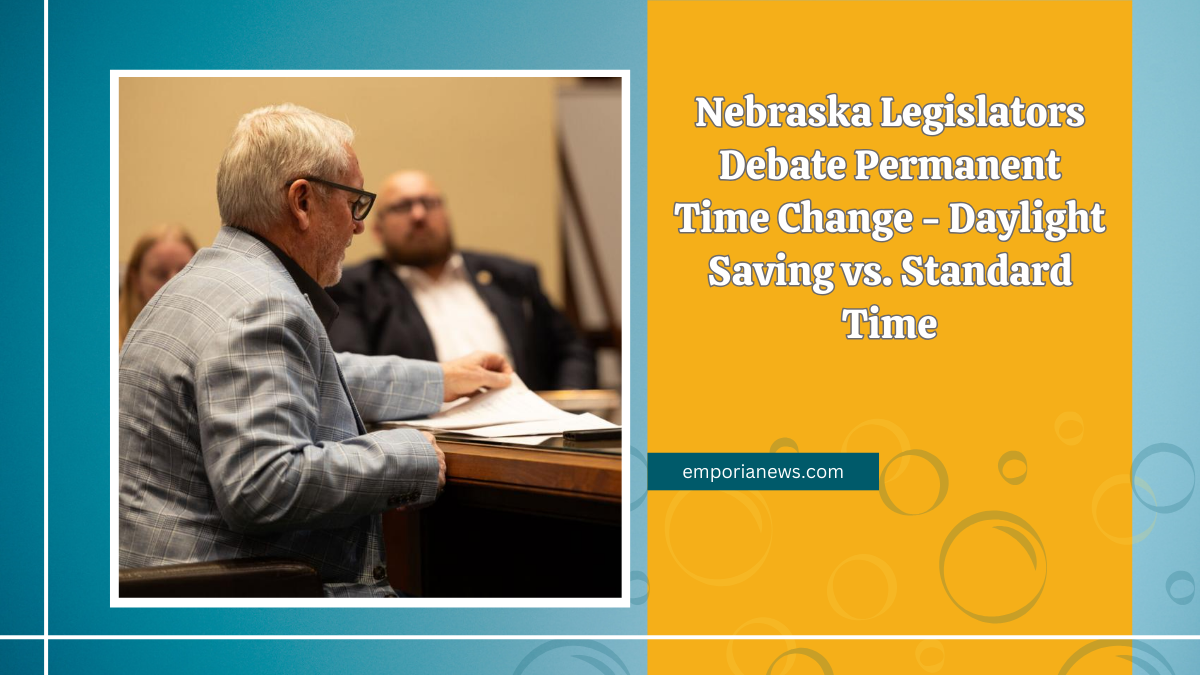In a significant move, Nebraska lawmakers have advanced two competing bills aiming to eliminate the biannual clock changes.
The proposals, however, differ on whether the state should adopt permanent daylight saving time or permanent standard time.
The Competing Bills
The Nebraska Legislature‘s Government, Military and Veterans Affairs Committee unanimously advanced two bills:
1. Legislative Bill 34 (LB34)
Introduced by State Sen. Megan Hunt of Omaha, this bill proposes year-round daylight saving time. This period, from March to November, offers extended evening daylight, which proponents argue benefits economic activities and social events.
2. Legislative Bill 302 (LB302)
Sponsored by State Sen. Dave Murman of Glenvil, this bill advocates for permanent standard time. This time frame, observed from November to March, provides earlier morning daylight, which supporters claim aligns better with natural circadian rhythms and health considerations.
Economic and Health Implications
Sen. Hunt emphasizes the economic advantages of permanent daylight saving time, suggesting that extended evening daylight could boost local businesses, recreational activities, and overall economic productivity.
She also notes potential mental health benefits, such as reduced seasonal depression due to increased exposure to evening sunlight.
Conversely, Sen. Murman, supported by Sen. Kathleen Kauth, highlights health concerns associated with daylight saving time.
They reference endorsements from major medical organizations, including the American Academy of Sleep Medicine and the American Medical Association, which advocate for permanent standard time to promote better sleep patterns and overall health.
Regional Coordination and Federal Considerations
Both bills include provisions that delay implementation until neighboring states adopt similar measures:
- LB34: Requires three adjacent states to adopt year-round daylight saving time before Nebraska implements the change.
- LB302: Mandates that Iowa, Kansas, South Dakota, and Wyoming enact legislation for year-round standard time prior to Nebraska’s adoption. Some senators suggest including Colorado to prevent creating a “time-zone island” in southwest Nebraska.
It’s important to note that federal law currently prohibits states from observing year-round daylight saving time but permits permanent standard time. States like Hawaii and most of Arizona have opted for permanent standard time.
Legislative Perspectives
The debate has elicited varied opinions among Nebraska legislators:
- Sen. John Cavanaugh of Omaha: Expresses ambivalence, acknowledging benefits of both proposals. He appreciates extended evening daylight for recreational activities but also values morning sunlight for family routines.
- Sen. Tanya Storer of Whitman: Supports permanent standard time, citing agricultural considerations. She notes that earlier daylight is beneficial for farmers and ensures safer conditions for students waiting for early morning buses in rural areas.
- Sen. Dunixi Guereca of Omaha: Leans towards permanent daylight saving time, humorously suggesting that extended evening daylight could enhance social activities, potentially even benefiting local sports teams’ performance.
Next Steps
As both bills progress, Nebraska lawmakers face the challenge of reaching a consensus on which time standard to adopt.
The decision will require careful consideration of economic benefits, health implications, and regional coordination. Public opinion and input from various stakeholders will likely play a crucial role in shaping the final outcome.
Comparison of LB34 and LB302
| Aspect | Legislative Bill 34 (LB34) | Legislative Bill 302 (LB302) |
|---|---|---|
| Proposed by | Sen. Megan Hunt | Sen. Dave Murman |
| Time Standard | Permanent Daylight Saving Time | Permanent Standard Time |
| Key Benefits | Extended evening daylight, economic boost, reduced seasonal depression | Alignment with natural circadian rhythms, health benefits |
| Implementation Requirement | Three adjacent states adopting year-round daylight saving time | Iowa, Kansas, South Dakota, and Wyoming adopting year-round standard time |
| Federal Law Compatibility | Currently prohibited without congressional approval | Permitted under existing federal law |
FAQs
Why is Nebraska considering eliminating the biannual clock changes?
Research indicates that changing clocks twice a year can lead to health issues, including increased risks of heart attacks, strokes, and accidents. Eliminating these changes aims to promote better health and consistency.
What are the main differences between daylight saving time and standard time?
Daylight saving time provides extended evening daylight, typically from March to November, while standard time offers earlier morning daylight, observed from November to March.
How would these changes impact neighboring states?
Both bills require neighboring states to adopt similar time standards before implementation to ensure regional consistency and avoid time-zone discrepancies.




